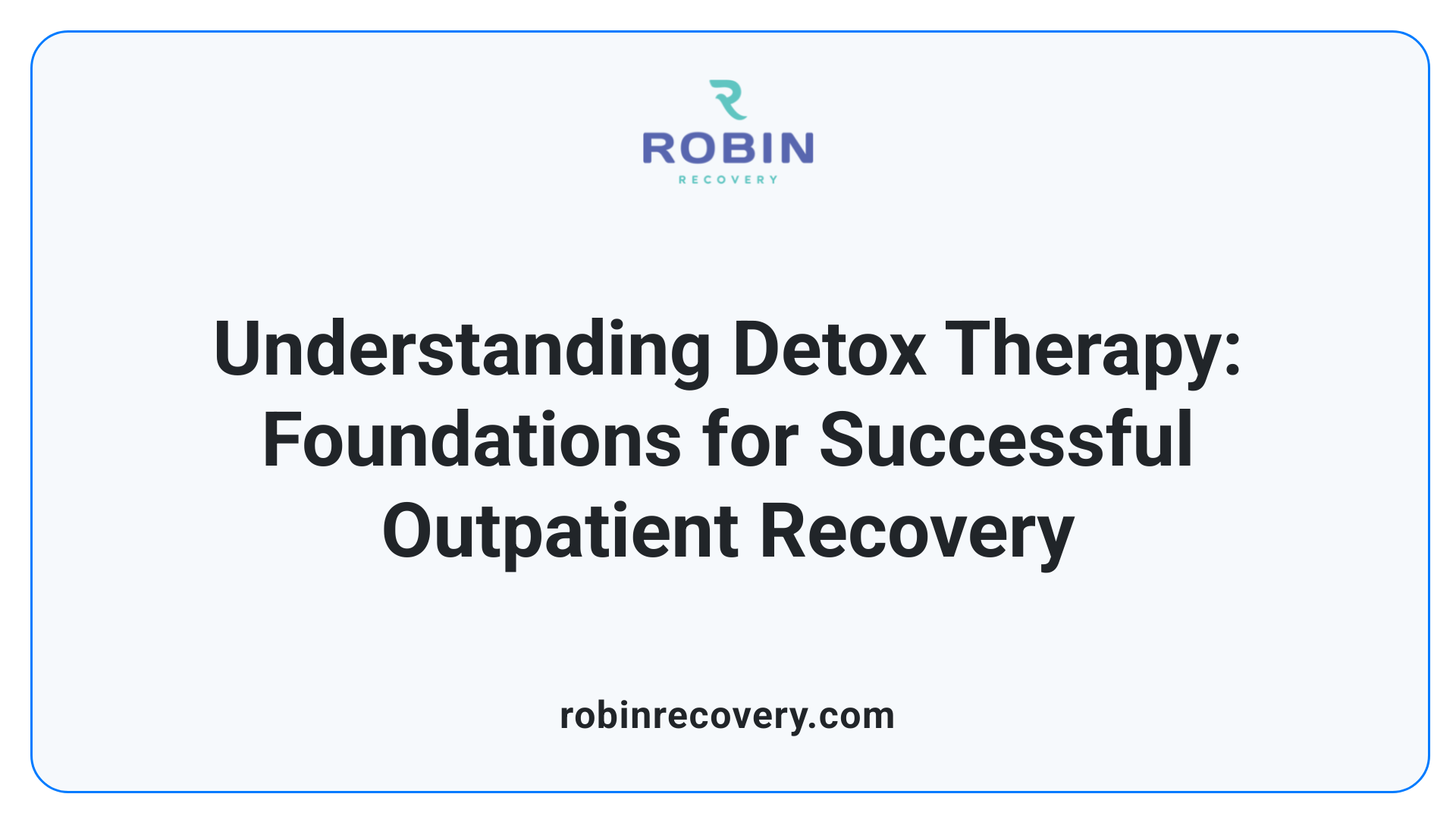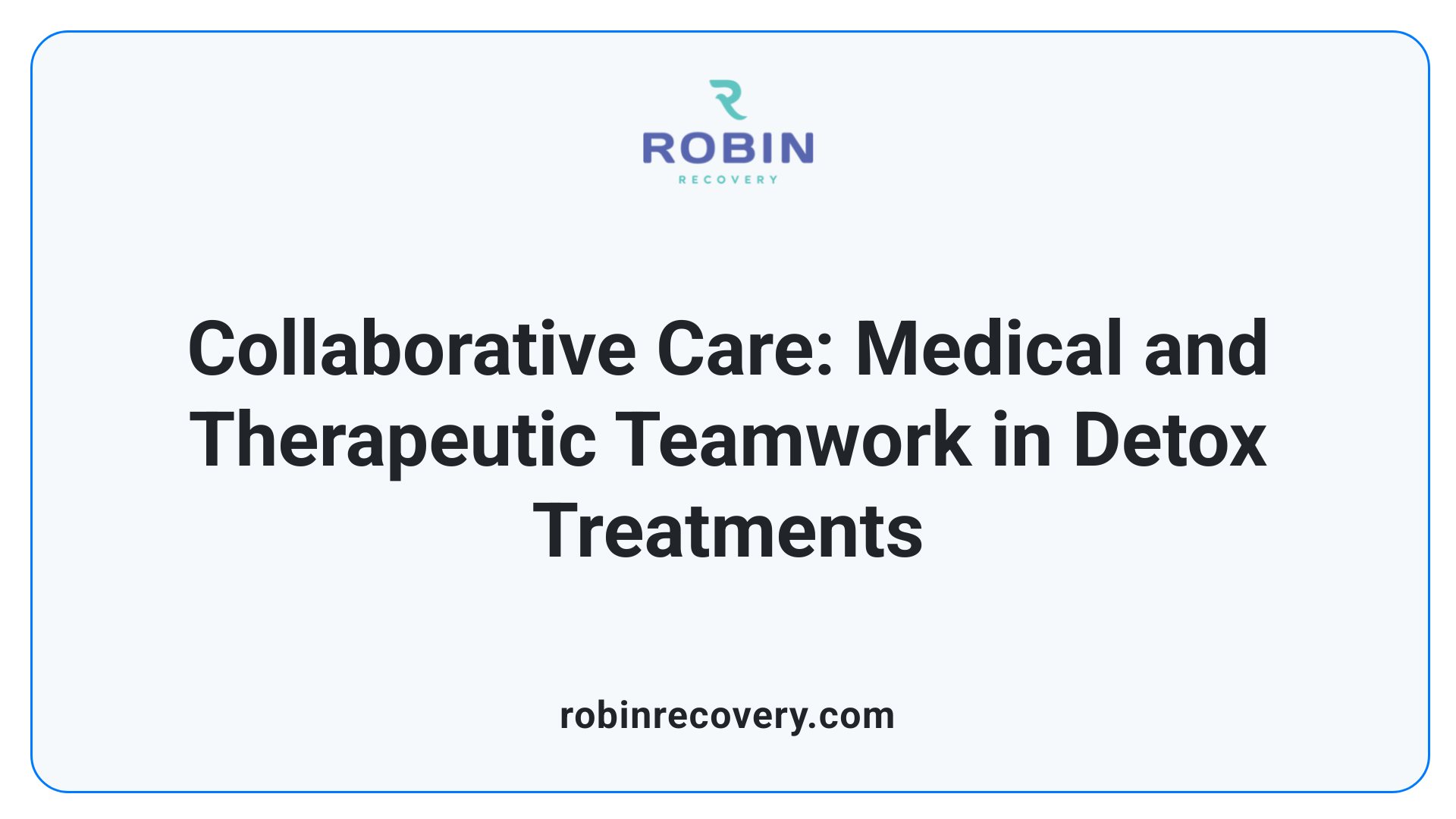The Role of Therapy in Ambulatory Detox Programs

Understanding the Intersection of Medical and Therapeutic Strategies in Ambulatory Detox
Ambulatory detox programs serve as a vital component in the continuum of addiction treatment, offering a flexible, patient-centered approach to managing withdrawal symptoms. While medical protocols, including medication-assisted treatment, are essential for stabilizing patients physically, therapy plays an equally crucial role in addressing the psychological and behavioral aspects of addiction. This article explores how therapeutic interventions are integrated into outpatient detox, contributing significantly to treatment success, relapse prevention, and long-term recovery.
Defining Detox Therapy and Its Purpose in Outpatient Settings

What is detox therapy?
Detox therapy, also known as detoxification, is a medical approach designed to safely manage withdrawal symptoms and remove harmful toxins from the body caused by substance abuse. It begins with a thorough assessment of the patient's substance use, health, and co-occurring conditions. Medical supervision is crucial during detox to stabilize the individual, often using medications such as benzodiazepines, anticonvulsants, or other FDA-approved drugs, depending on the substance involved.
This process not only eases physical withdrawal but also prevents serious complications like seizures or delirium. Importantly, detoxification is the initial step in the broader spectrum of addiction treatment. It prepares the individual for ongoing psychological and behavioral therapies, forming the foundation for sustained recovery.
While detox can be performed in inpatient or outpatient settings, outpatient detox offers a flexible, less disruptive option suitable for many individuals. It emphasizes safety, comfort, and preparing the patient for long-term treatment programs, including therapy and support groups.
Purpose of detox therapy in outpatient programs
Outpatient detox programs aim to facilitate a controlled and safe withdrawal process while allowing patients to maintain their daily routines. These programs are ideal for those with mild-to-moderate withdrawal symptoms and stable medical conditions. The main goals are to reduce physical harm, address withdrawal symptoms promptly, and prevent relapse.
During outpatient detox, patients regularly visit healthcare providers for monitoring, medication management, and counseling. This setting supports the patient's recovery journey by providing medical oversight without the need for hospital stays, making it more accessible and affordable.
An essential aspect of outpatient detox is the integration with longer-term treatment plans. Post-detox, individuals are encouraged to participate in therapy, support groups, and ongoing counseling to build skills for managing cravings, triggers, and underlying issues associated with addiction.
How detox therapy supports recovery
Detox therapy plays a vital role in the recovery process by creating a stable physical state from which psychological and behavioral treatments can commence effectively. Managing withdrawal symptoms reduces the risk of dangerous complications and decreases the likelihood of early relapse.
In outpatient settings, detox can be combined with evidence-based interventions such as medication-assisted treatment (MAT), counseling, and education. Medications like buprenorphine, naltrexone, acamprosate, and others help control cravings and support brain recovery.
Counseling and behavioral therapies provided during and after detox teach coping skills, address emotional and mental health issues, and reinforce commitment to sobriety. Additionally, programs often include family participation and educational resources, fostering a supportive environment.
Overall, outpatient detox serves as a bridge to long-term recovery, promoting a gradual transition from dependence to independence and a healthier lifestyle. The combination of medical management and psychological support maximizes the chances of lasting sobriety, emphasizing the importance of personalized care tailored to each patient's needs.
Aspect Description Additional Details Settings Inpatient vs. outpatient (ambulatory) Choice depends on severity, health, and stability Typical Duration Outpatient: around 6.5 days; inpatient: 5-14 days Duration varies by individual needs Treatment Components Evaluation, medication, education, counseling All aimed at safe withdrawal and preparing for ongoing care Medications Benzodiazepines, anticonvulsants, MAT options Tailored to substance and patient condition Risks and Benefits Outpatient is cost-effective but risk of relapse; inpatient offers safety but costlier Choice guided by individual risk assessment Long-term Outcomes Similar success rates in inpatient vs. outpatient; influenced by patient factors Long-term recovery depends on support and engagement Supportive Interventions Counseling, cue exposure, therapy, family participation Enhance transition to ongoing treatment
This comprehensive approach underscores that detoxification in outpatient settings is a viable, effective option for many individuals seeking recovery from alcohol or drug dependence, emphasizing safety, personalization, and long-term support.
Integrating Therapy: Strategies and Modalities in Outpatient Detox Programs

What is detox therapy?
Detox therapy, or detoxification, is a crucial medical process that helps manage withdrawal symptoms safely when someone stops using addictive substances like alcohol or drugs. It begins with a thorough evaluation of the individual's substance use history, physical health, and any co-existing mental health conditions. Medical professionals often provide medications such as benzodiazepines, anticonvulsants, or specific agents like methadone or buprenorphine to ease withdrawal discomfort and prevent serious complications like seizures or delirium.
Detox isn't just about removing toxins; it's a foundation for ongoing treatment. It prepares the individual physically and psychologically for deeper therapy and recovery efforts. While detox can take place in various settings, outpatient clinics are common for mild to moderate cases, offering supervised care without requiring hospitalization. Importantly, detoxification is only the first step—successful recovery involves continued psychological, social, and behavioral therapies to address addiction's complex roots.
What are the strategies for detoxification?
The primary goal of detoxification strategies is to support the body's natural ability to eliminate toxins and adapt to the absence of substances. Rather than relying on quick-fix detox diets or unproven supplements, evidence-based practices focus on promoting health through hydration, good nutrition, and physical activity.
Key recommendations include staying well-hydrated with water or electrolyte drinks, consuming a balanced diet rich in fruits, vegetables, and antioxidants, and avoiding processed foods and alcohol. Regular exercise can boost circulation and support overall well-being. Although many products and routines claim to detoxify the body rapidly, scientific research indicates that the liver, kidneys, and other organs naturally perform these functions efficiently without special cleansing routines.
In clinical settings, detox protocols are tailored to the substance involved, the severity of dependence, and the individual's health status. Medications are used judiciously to alleviate withdrawal symptoms, monitor vital signs, and prevent adverse reactions. Overall, supporting the body's natural detox processes through healthy lifestyle choices and medical supervision forms the core of effective detox strategies.
The Significance of Therapy in Enhancing Detox Outcomes

How therapy supports recovery and relapse prevention
Therapy plays a vital role in the detoxification process by addressing the psychological aspects of addiction. During detox, counseling sessions help patients understand the roots of their substance dependence, fostering self-awareness and motivation for change.
By incorporating therapy, individuals learn to recognize triggers that lead to substance use and develop strategies to avoid or manage these situations. Cognitive-behavioral therapy (CBT), for instance, equips patients with skills to challenge negative thoughts and develop healthier behavioral patterns.
Moreover, therapy fosters relapse prevention by instilling long-term coping skills. Patients gain tools to handle stress, emotional distress, and social pressures without resorting to substance use. This ongoing support significantly reduces the likelihood of relapse after detox.
Role of ongoing psychological support
Post-detox, continuous psychological support is crucial for maintaining sobriety. Outpatient programs often incorporate regular counseling, group therapy, and family involvement.
Group therapy sessions create a community environment where patients share experiences and foster mutual support. Family counseling helps repair relationships and build a supportive home environment, which is essential for sustained recovery.
Virtual counseling options have also expanded access to psychological support, allowing flexible and consistent therapy sessions that fit into patients' everyday routines.
Development of life skills and coping strategies
Detox is not just about managing withdrawal symptoms—it's an opportunity to build resilience. Therapists work with patients to develop practical life skills such as stress management, problem-solving, and effective communication.
These skills empower individuals to handle everyday challenges without turning to substances. For example, learning relaxation techniques or time management can significantly reduce stress levels.
Furthermore, therapy sessions often focus on setting realistic goals and fostering motivation for ongoing recovery efforts. Equipping patients with these skills enhances their confidence and self-efficacy, increasing the chances of long-term sobriety.
Aspect Main Focus How It Supports Detox and Recovery Psychological Counseling Address emotional and mental health issues Reduces cravings, prevents relapse, and enhances motivation Group Therapy Peer support and shared experiences Builds community, reduces feelings of isolation Family Therapy Rebuilds support systems Improves communication and creates a stable environment Life Skills Development Practical coping mechanisms Equips patients to handle daily stressors without substances
Understanding the integral role of therapy underscores its importance beyond the initial detox phase. It sets the foundation for a successful, long-term recovery journey by addressing both psychological and practical aspects of addiction treatment.
When choosing a detox setting, why is proper assessment essential?
The setting for detoxification should match the medical and psychological needs of the patient and provide adequate monitoring to ensure safety, such as tracking vital signs and oxygen levels. Outpatient detox is suitable for those with mild to moderate symptoms and a strong support system, whereas inpatient care is reserved for individuals with severe symptoms or complications.
How does outpatient detoxification work?
Outpatient detox allows patients to recover at home while maintaining contact with healthcare providers. Patients may receive medications to manage withdrawal symptoms and are guided through the detox process, preparing them for subsequent treatment stages.
This flexibility makes outpatient detox an appealing option for individuals committed to recovery but needing ongoing medical oversight. Regular check-ins, whether in person or virtual, help monitor progress and adjust treatment as necessary, ensuring safety and effectiveness.
The Multidisciplinary Approach: Medical and Therapeutic Team Collaborations

What is detox therapy?
Detox therapy, also known as detoxification, is a medical process designed to safely manage withdrawal symptoms and eliminate toxins from the body resulting from substance abuse. It begins with a thorough assessment of the individual's substance use history, physical health, and any co-occurring conditions. Medical supervision during detox often involves medications such as benzodiazepines, anticonvulsants, or specific treatments like buprenorphine or naltrexone that help ease withdrawal discomfort and prevent severe complications such as seizures.
Detox is only the initial phase of comprehensive addiction treatment. It prepares the individual physically for further psychological and behavioral therapies aimed at long-term recovery. The setting of detox varies from outpatient clinics to inpatient hospital units, depending on the severity of dependence and individual needs. Post-detox, patients typically engage in therapies, counseling, and support groups designed to address underlying issues related to substance dependence. The collaborative efforts of the medical team are crucial to ensure safety and effective transition into ongoing recovery programs.
What are the strategies for detoxification?
Detoxification strategies emphasize supporting the body's natural detox systems—primarily the liver, kidneys, digestive tract, and skin—without relying on unproven or overly restrictive diets. Staying well-hydrated is fundamental, often complemented by eating a balanced diet rich in fruits, vegetables, and antioxidants to support healing.
Limiting processed foods, alcohol, and caffeine can help reduce the burden on detox organs, while engaging in regular exercise enhances circulation and promotes elimination. Although some products like detox water or herbal supplements are popular, scientific evidence supporting their ability to remove toxins directly is limited.
It is important to clarify that rapid detox diets or cleanses are unnecessary and may cause health issues, especially for those with underlying medical conditions. Instead, promoting overall health through balanced nutrition, hydration, and physical activity aids the body's own detox processes naturally.
Roles of the medical and therapy team in outpatient detox
In outpatient detox programs, a cohesive team of healthcare professionals collaborates to deliver personalized treatment plans. Physicians are responsible for evaluating the patient's medical status, prescribing medications, and monitoring vital signs during detox. Their role includes adjusting medication dosages to ensure safety and efficacy.
Therapists and counselors provide emotional support, conduct individual and group therapy sessions, and help patients develop coping strategies to handle cravings and emotional triggers. They also facilitate counseling on relapse prevention and assist in addressing psychological and behavioral aspects of addiction.
Support staff, such as nurses and social workers, contribute by assisting with medication administration, monitoring patient progress, and coordinating care. They ensure patients follow their individualized plans, maintain compliance with treatment schedules, and stay motivated throughout the detox process.
Monitoring and personalized care plans
Effective outpatient detox relies on meticulous monitoring tailored to each patient's clinical needs. Medical assessments during initial visits determine the severity of withdrawal symptoms and inform the choice of medications and supportive therapies.
Throughout treatment, patients undergo regular check-ins—either in person or virtually—to track vital signs, manage side effects, and make necessary adjustments. Using standardized tools such as the Clinical Institute Withdrawal Assessment for Alcohol (CIWA-Ar) or the Clinical Opiate Withdrawal Scale (COWS) helps objectively measure withdrawal severity and guide interventions.
Personalized care plans are central to successful detox outcomes. These plans incorporate the specific substance involved, the patient's medical history, mental health status, social support, and readiness for change. The team aims to create an adaptable plan that ensures safety, comfort, and engagement, increasing the likelihood of a smooth detox and transition to long-term treatment.
Patient engagement and active participation
Patient involvement is a cornerstone of successful outpatient detoxification. Patients are encouraged to actively participate through education about their condition, medication adherence, and participation in counseling sessions.
Engagement strategies include setting realistic goals, providing motivational interviewing, and involving family members when appropriate. Addressing concerns and fostering a supportive environment empower patients to take ownership of their recovery.
Additionally, active participation involves following medical instructions carefully, attending all scheduled appointments, maintaining open communication with the care team, and utilizing social support systems. This collaborative approach enhances the safety and effectiveness of detox, ultimately laying a strong foundation for achieving lasting sobriety.
Conclusion: Embracing Therapy as a Pillar of Outpatient Detox Success

What is detox therapy?
Detox therapy, or detoxification, is a crucial medical process aimed at safely managing withdrawal symptoms and removing toxins accumulated due to substance abuse. It begins with a thorough assessment of the individual's drug or alcohol use, co-existing health conditions, and physical state. Following this, medical supervision — often involving specific medications like benzodiazepines for alcohol withdrawal or buprenorphine for opioids — helps stabilize the patient, reduce discomfort, and prevent serious complications such as seizures.
While detoxification is essential for clearing substances from the body, it serves as the initial step toward long-term recovery. It is generally complemented by psychological support, counseling, and behavioral therapies, which work together to address the mental and emotional challenges of addiction.
Detox settings can range from outpatient clinics, where patients visit regularly, to inpatient units offering round-the-clock care. The ultimate goal is to prepare the individual physically and psychologically for ongoing treatment, including therapies that promote sustained sobriety.
What strategies for detoxification?
Strategies for detoxification revolve around supporting the body's natural detox systems—primarily the liver, kidneys, digestive system, and sweat mechanisms—without relying on unproven or unnecessary detox diets or products.
Key practices include:
- Staying well-hydrated to assist kidney function
- Consuming a nutrient-rich diet high in antioxidants to support detox pathways
- Limiting processed foods and alcohol intake
- Engaging in regular physical activity to boost circulation and metabolism
Although some claim that special
Conclusion: Integrating Therapy for Lasting Recovery
In outpatient detox programs, therapy serves as a cornerstone that not only facilitates the immediate management of withdrawal symptoms but also builds a foundation for sustainable recovery. By combining medical stabilization with psychological support, behavioral therapies, and family involvement, outpatient programs address the complex factors contributing to addiction. This integrated approach enhances patient motivation, equips individuals with coping skills, and reduces the risk of relapse. As research continues to underscore the importance of comprehensive care, therapy remains an indispensable element in the success and longevity of outpatient detoxification efforts, offering hope for healthier, addiction-free futures.
References
- An Overview of Outpatient and Inpatient Detoxification - PMC
- How Ambulatory Detoxification Works - Tampa
- Ambulatory Detoxification Explained
- Ambulatory Detox: Ensuring Safety and Comfort
- Ambulatory detoxification in alcohol use disorder and ...
- The Ambulatory Detox Program
- Managing Withdrawal Symptoms Through Outpatient ...
- Ambulatory Detoxification of Patients with Alcohol ...
- What Is Ambulatory Detox? | CMAR
